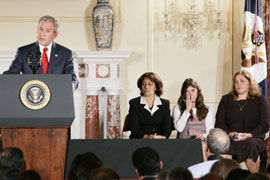UN votes against US embargo on Cuba
The resolution, passed for the 16th year, has had no impact on the US.

The resolution, titled Necessity of Ending the Economic, Commercial and Financial Embargo imposed by the United States of America against Cuba, was passed with 184 votes in favour, four against and one abstention.
Israel joined the US in voting against the resolution, as did Palau and the Marshall Islands. Micronesia abstained.
Last week, George Bush, the US president, rejected a proposal to ease sanctions, arguing that it would only give the communist government greater power.
In his first formal speech on Cuba since Fidel Castro, the country’s ailing leader, handed power to his brother Raul in July 2006, Bush said the government was a “disgraced and dying order”.
He encouraged Cubans to push for democratic change.
Every year since 1992, the UN general assembly has told the US to lift the embargo against Cuba. Last year’s resolution was approved by 183-four, with one abstention.
Perez Roque, in his speech to the assembly, said: “The United States has ignored, with both arrogance and political blindness, the 15 resolutions adopted by this general assembly calling for the lifting of the blockade against Cuba.”
Call for democracy
However, The Bush administration has tightened embargoes,
including restrictions on visits to Cuba and remittances to families.
 |
| Bush last week rejected any easing of sanctions without Cuba becoming a democracy [Reuters] |
Ronald Godard, the US mission’s adviser on Latin American affairs, told the general assembly that the US was the largest provider of humanitarian aid to the Cuban people and he blamed Cuba‘s own policies for hardships there.
He urged the world to press Cuba towards democracy instead of voting against US policy.
“It is long past time that the Cuban people enjoy the blessings of economic and political freedom,” he said.
Perez Roque said the embargo had cost Cuba more than $89bn in more than 40 years, which he said was the equivalent of $222bn in current dollar terms.
“The blockade is today the main obstacle to the development and well-being of the Cubans and a blatant, massive and systematic violation of the rights of our people,” he said.
Perez Roque mentioned US filmmakers Michael Moore and Oliver Stone as examples of how Washington had tried to restrict freedom of speech by hampering their efforts to film in Cuba.
“With its grotesque persecution of the honest word and independent art, the president of the United States is emulating the inquisition of the Middle Ages,” he said.
Several speakers who voted in favour of the resolution, including representatives of the European Union and Australia, said they did so despite concerns about human rights in Cuba. They called for political prisoners to be released.